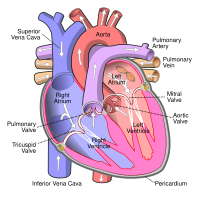
Photo from wikipedia
We investigated the effects of 2 weeks of detraining on cardiopulmonary function and muscular fitness in 15 endurance-trained male athletes (age: 19-26 years; height: 176.1 ± 7.5 cm; body mass:… Click to show full abstract
We investigated the effects of 2 weeks of detraining on cardiopulmonary function and muscular fitness in 15 endurance-trained male athletes (age: 19-26 years; height: 176.1 ± 7.5 cm; body mass: 68.3 ± 7.6 kg). VO2max, exercise time to exhaustion (ET), maximal stroke volume (SVmax), maximal heart rate (HRmax), isokinetic muscle strength, and muscle endurance were measured before and after 2 weeks of detraining. We determined that short-term detraining resulted in a significant decrease (p < 0.05) in VO2max, ET, SVmax and isokinetic knee extensor strength but not in isokinetic knee flexor strength or muscle endurance. HRmax and body mass increased significantly (p < 0.05), whereas body fat percentage remained stable after detraining. Furthermore, significant correlations were identified between VO2max and SVmax (p < 0.01, r = 0.6) and between VO2max and knee extensor strength (p < 0.01, r = 0.6). The results suggest that 2 weeks of detraining reduces cardiopulmonary functions, possibly as a result of the attenuation of hemodynamic and neuromuscular adaptations. Moreover, we observed that short periods of detraining appeared to increase lean mass and maintain muscle endurance in endurance runners.
Journal Title: European journal of sport science
Year Published: 2021
Link to full text (if available)
Share on Social Media: Sign Up to like & get
recommendations!